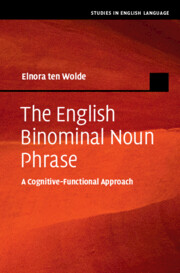Book contents
- The English Binominal Noun Phrase
- Studies in English Language
- The English Binominal Noun Phrase
- Copyright page
- Dedication
- Contents
- Figures
- Tables
- Acknowledgments
- Abbreviations
- Chapter 1 Introduction
- Part I Categorization
- Chapter 2 Of-binominal Classification
- Chapter 3 From Prototypical N+PP to Pseudo-partitive
- Chapter 4 The Evaluative Of-binominals
- Chapter 5 Three Case Studies: Cake, Beast, and Hell
- Part II Testing the Hypothesis
- Part III Theoretical Analysis
- Part IV Discussion
- References
- Index
Chapter 5 - Three Case Studies: Cake, Beast, and Hell
from Part I - Categorization
Published online by Cambridge University Press: 29 June 2023
- The English Binominal Noun Phrase
- Studies in English Language
- The English Binominal Noun Phrase
- Copyright page
- Dedication
- Contents
- Figures
- Tables
- Acknowledgments
- Abbreviations
- Chapter 1 Introduction
- Part I Categorization
- Chapter 2 Of-binominal Classification
- Chapter 3 From Prototypical N+PP to Pseudo-partitive
- Chapter 4 The Evaluative Of-binominals
- Chapter 5 Three Case Studies: Cake, Beast, and Hell
- Part II Testing the Hypothesis
- Part III Theoretical Analysis
- Part IV Discussion
- References
- Index
Summary
The three case studies presented in this chapter demonstrate that the six of-binominals introduced in Chapters 3 and 4 form a grammaticalization path, starting at the N+PP and ending, in most cases, at the BI (cake is the exception). The chapter begins with a discussion about the differences between grammaticalization and lexicalization, since both processes are plausible in this case. Then, looking at the first nouns beast, cake and hell (an animate, inanimate, and abstract first noun respectively) and using a range of historical corpora, this chapter presents a qualitative diachronic analysis that looks at first attestations of and discusses the use of these first nouns in the six of-binominal constructions presented in Chapters 3 and 4. Ultimately this chapter substantiates the claim that first nouns progress from the N+PP to the head-classifier, in some cases pseudo-partitive, then the EBNP, the EM, and the BI. Furthermore, it argues that the process demonstrated is indeed grammaticalization rather than lexicalization.
Keywords
- Type
- Chapter
- Information
- The English Binominal Noun PhraseA Cognitive-Functional Approach, pp. 96 - 114Publisher: Cambridge University PressPrint publication year: 2023



